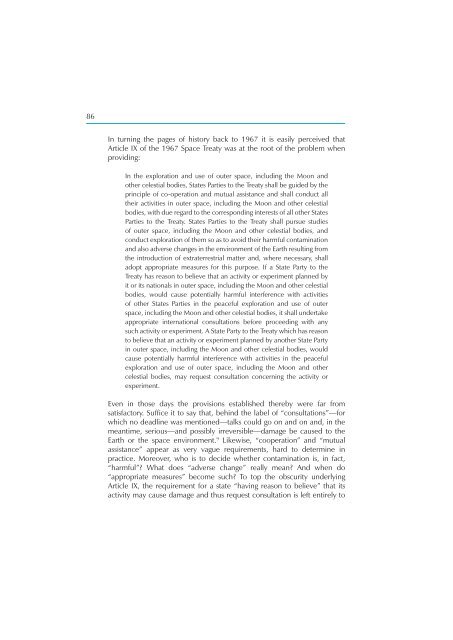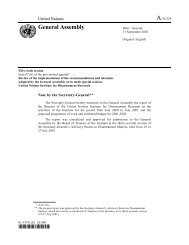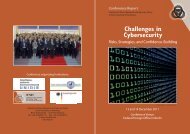Security in Space The Next Generation - UNIDIR
Security in Space The Next Generation - UNIDIR
Security in Space The Next Generation - UNIDIR
You also want an ePaper? Increase the reach of your titles
YUMPU automatically turns print PDFs into web optimized ePapers that Google loves.
86<br />
In turn<strong>in</strong>g the pages of history back to 1967 it is easily perceived that<br />
Article IX of the 1967 <strong>Space</strong> Treaty was at the root of the problem when<br />
provid<strong>in</strong>g:<br />
In the exploration and use of outer space, <strong>in</strong>clud<strong>in</strong>g the Moon and<br />
other celestial bodies, States Parties to the Treaty shall be guided by the<br />
pr<strong>in</strong>ciple of co-operation and mutual assistance and shall conduct all<br />
their activities <strong>in</strong> outer space, <strong>in</strong>clud<strong>in</strong>g the Moon and other celestial<br />
bodies, with due regard to the correspond<strong>in</strong>g <strong>in</strong>terests of all other States<br />
Parties to the Treaty. States Parties to the Treaty shall pursue studies<br />
of outer space, <strong>in</strong>clud<strong>in</strong>g the Moon and other celestial bodies, and<br />
conduct exploration of them so as to avoid their harmful contam<strong>in</strong>ation<br />
and also adverse changes <strong>in</strong> the environment of the Earth result<strong>in</strong>g from<br />
the <strong>in</strong>troduction of extraterrestrial matter and, where necessary, shall<br />
adopt appropriate measures for this purpose. If a State Party to the<br />
Treaty has reason to believe that an activity or experiment planned by<br />
it or its nationals <strong>in</strong> outer space, <strong>in</strong>clud<strong>in</strong>g the Moon and other celestial<br />
bodies, would cause potentially harmful <strong>in</strong>terference with activities<br />
of other States Parties <strong>in</strong> the peaceful exploration and use of outer<br />
space, <strong>in</strong>clud<strong>in</strong>g the Moon and other celestial bodies, it shall undertake<br />
appropriate <strong>in</strong>ternational consultations before proceed<strong>in</strong>g with any<br />
such activity or experiment. A State Party to the Treaty which has reason<br />
to believe that an activity or experiment planned by another State Party<br />
<strong>in</strong> outer space, <strong>in</strong>clud<strong>in</strong>g the Moon and other celestial bodies, would<br />
cause potentially harmful <strong>in</strong>terference with activities <strong>in</strong> the peaceful<br />
exploration and use of outer space, <strong>in</strong>clud<strong>in</strong>g the Moon and other<br />
celestial bodies, may request consultation concern<strong>in</strong>g the activity or<br />
experiment.<br />
Even <strong>in</strong> those days the provisions established thereby were far from<br />
satisfactory. Suffi ce it to say that, beh<strong>in</strong>d the label of “consultations”—for<br />
which no deadl<strong>in</strong>e was mentioned—talks could go on and on and, <strong>in</strong> the<br />
meantime, serious—and possibly irreversible—damage be caused to the<br />
Earth or the space environment. 9 Likewise, “cooperation” and “mutual<br />
assistance” appear as very vague requirements, hard to determ<strong>in</strong>e <strong>in</strong><br />
practice. Moreover, who is to decide whether contam<strong>in</strong>ation is, <strong>in</strong> fact,<br />
“harmful”? What does “adverse change” really mean? And when do<br />
“appropriate measures” become such? To top the obscurity underly<strong>in</strong>g<br />
Article IX, the requirement for a state “hav<strong>in</strong>g reason to believe” that its<br />
activity may cause damage and thus request consultation is left entirely to








